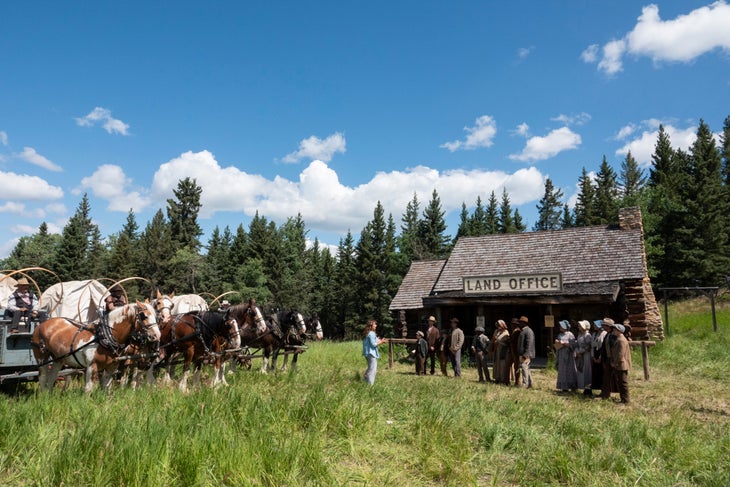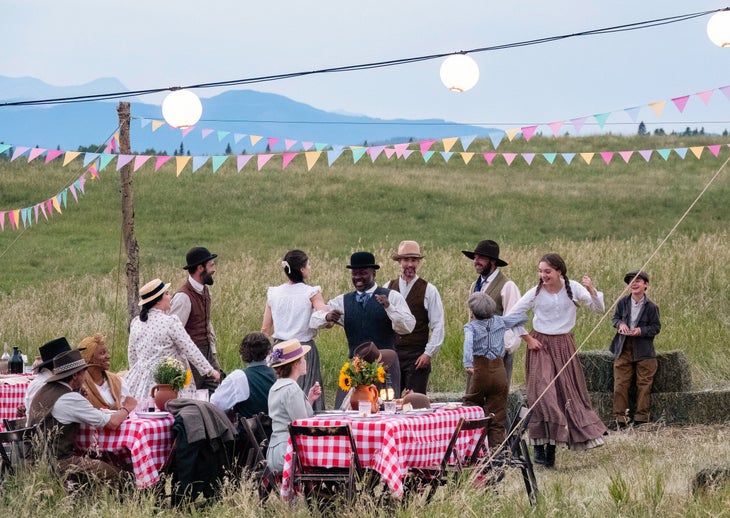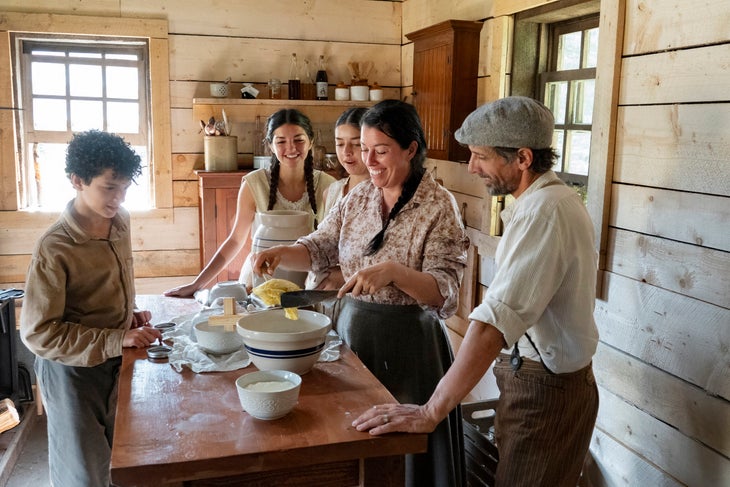If I had a chance to be magically transported back to the American frontier in the 1880s, I’d leap enthusiastically into the back of the covered wagon. At least for a temporary stretch, I’d welcome life in simpler times. There are aspects of our modern day, especially as a parent, that I wonder would be improved by going back in time.
A new reality TV show, “Back to the Frontier,” recreates these exact living conditions for a group of modern participants—families who agree to leave the 21st century behind to live like our ancestors did on the edge of civilization. Three families are challenged to live eight weeks on grassy plains near Calgary, Alberta, as 1880s homesteaders would. That means no running water, electricity, technology, or supermarkets.
Produced by by Magnolia Network co-owners Chip and Joanna Gaines, the home improvement power couple from “Fixer Upper,” the new series also streams on HBO Max. As a mother of two young kids who at times wishes we lived before the advent of the internet, I am particularly interested in how going back to the land and zero screen time affects parenting. So I phoned up two of the participants—partners Stacey and Joaquin Loper—to discuss the challenges and lessons learned from this daring social experiment they agreed to.
When an invitation to the show arrived in Stacey Loper’s inbox, her first thought was that her husband would love to participate. Joaquin, she said, has sought to teach the couple’s two boys about the history of Black Americans, and about the lives that their ancestors experienced. So, to have the opportunity to show the children seemed invaluable.
For Stacey, it was a tougher sell. “I’m not an ‘outside girl’ at all,” she told me when I spoke to the couple about their time on the show. Despite the transparency of the production staff, Stacey said she was completely unprepared for the experience when she first set foot in the cabin. All three families faced specific challenges with their shelter—to simulate life on the frontier—and the Loper’s home was missing a wall.
“I set myself up for failure,” Stacey said. “I wouldn’t allow my mind to wrap around that this was truly the life I was about to live for the next eight weeks.” While Joaquin felt prepared—he’s a veteran of the U.S. Air Force, and a dedicated outdoorsman—he was surprised by an unforeseen struggle.“I wasn’t prepared for how unprepared she was,” he says, laughing.

The Lopers live in a five-bedroom, four-and-a-half bath home in Alabama, and both Stacey and Joaquin are grief and marriage recovery counselors. Their boys, Landen and Maddox, are 15 and 12, respectively. For the first half of the show, the family brought along their secret weapon: Joaquin’s mother, Shirley, who was raised on a farm in the South.
Even with the initial help from Shirley, there were hurdles to overcome, mostly for Stacey, who says she doesn’t even like grass—”The grass was way too high. It came up to my chest!” she told me.
The family banded together and experienced something that many modern-day families could benefit from. By stripping away their everyday conveniences such as supermarkets and technology, relying on livestock and their own gardening skills for food, and learning to create their own joy and entertainment, they gained an appreciation for the small things.
“I wasn’t a vegetable girl before the frontier,” says Stacey, “But, baby, I ate so many cucumbers, tomatoes, and carrots.” Now when Stacey goes to the grocery store she sees these vegetables as a gift from nature and the produce aisle is one of her first stops.
From Screens to Streams: Refocusing in Nature
On the frontier their kids were using their surroundings to find fun, like skipping rocks in the nearby stream. “One of the most beautiful things for me to see my kids do was run around with sticks playing cops and robbers,” says Joaquin. “They were using their imagination instead of a screen, and building images in their mind instead of on the screen.” For Stacey, one of her fondest memories of their time on the frontier was when her boys created a volleyball net with two carpenter horses and some planks, resulting in hours of fun with the neighboring contestants’ boys.

Even before arriving on the frontier, Joaquin and Stacey always set ground rules for screen time. Their two kids were required to go outside for a few hours and read books together. After filming the show, the Lopers have mandated time for the family to converse—periods when the phones must be turned off. “That time without screens shows how their creativity and their imagination work as well—they’re not overloaded with all of this stuff on their phone or all this stuff on their tablets,” says Joaquin.
My husband and I are no strangers to the lure of kids and technology. While our 6 and 10-year-olds don’t yet have cell phones, they have iPad and video games. We’ve set limits on how much time they can spend with these things, but there’s no doubt that even limited use has its downfalls. I fear that with the drug of screen time they’ve lost the ability to see the world, use their imagination, and just simply be present in the moment.
The Loper children weren’t the only ones who learned to find joy in the simple things. Both Joaquin and Stacey didn’t grow up in wealthy homes, and were constantly “looking to see what other people had, or what we thought we wanted or needed,” says Joaquin. In modern day life, Stacey tells me that she was completely consumed by a lifestyle of materialism.
In the first episode, Stacey breaks into tears when her children are forced to eat canned meat for their first meal. The meal was reminiscent of her own childhood and reminded her of the efforts she’s taken to prevent her kids from experiencing poverty. “I feel so insufficient,” she tells the camera.
Fast forward to present day, back home and their frontier days behind them, Stacey can see the beauty in all of it. “I’ll tell you, living as an 1880s wife and mom, I felt the richest that I’ve ever had in my life.”

Homesteading: A Growing Modern Movement
There’s a growing group of modern-day families choosing to leave the materialistic world behind and become homesteaders—off the land and completely self-sufficient. YouTube channels like Living Traditions Homestead have close to one million followers, and today’s homesteaders are creating popular Instagram accounts that teach people how to raise chickens, can summer produce, and even build their own homes.
Although their eight weeks on the frontier didn’t convert the Lopers into homesteaders, it still taught them important lessons. Life’s joys aren’t about having the biggest house or getting the newest iPhone. It’s about their family; open communication, love, and finding strength and resilience in each other. It’s about sleeping in a warm bed and not seeing icicles forming on their frontier cabin ceiling. And of course, the never-ending appreciation for running water.
As a mother, always striving to pass my love of nature onto my own children, the show confirmed my fears of the effects of too much screen time and the importance of seeing the world in real time. Of course, it’s perfectly okay for us to enjoy a bit of simulated life on TV or online, but I’ll be taking my kids on more walks in the woods and teaching them the joys of finding entertainment outside.
Back to the Frontier airs Thursday on the Magnolia Network 8pm ET, and streams on HBO Max.
_____________________________________________________
Megan Margulies was born and raised in New York City, but harbors a deep love for nature. She splits her time between Boston and a cabin in Vermont, where she tries to put Back to the Basics: How to Learn and Enjoy Traditional American Skills to use.
